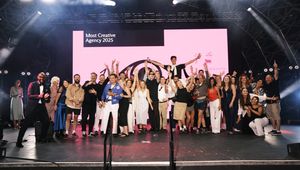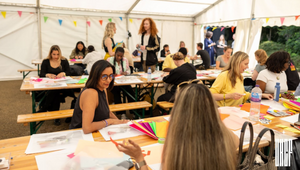
Katie Keith on British Creativity, Diverse Juries and Emerging Talent

Last week marked the end of another big year for Creative Circle. Firstly, Vicki Maguire was announced as the Circle’s first female present, kicking off her presidency with a rousing manifesto before unveiling an ‘angry, anarchic’ graphic identity. Then there was the announcement of the Creative Circle Foundation, a free full time school that’ll help actually tackle those much discussed diversity issues by giving those who can’t afford expensive ad courses a way into the industry. And the year was capped off with a sold-out Creative Circle Ball, celebrating the very best of British creativity from the last year.
We caught up with Katie Keith, First Lady of Rattling Stick and member of the Creative Circle’s inner council, to talk about her experience as this year’s Film Craft jury president and the diversity issues our industry is facing…
CC> Firstly, congratulations on leading the Film Craft jury at this year’s Creative Circle awards. What did you and your jurors look for in this year’s entries?
KK> What I really enjoy about judging craft is that you’re not being asked to judge the idea or its effectiveness, you’re looking at all the elements that make the film. Essentially, you get to separate the idea from the execution. Thoughts around an idea can be quite subjective but when you’re looking at craft, it’s about assessing what each individual has brought to the final film, each contribution in its own right.
What I respect about Creative Circle is that the people responsible for the craft judge the craft. The jury is made up of varied selection from the different areas of the industry, whether it be agency, sound, editing, direction - you know that the people judging the work appreciate and understand the craft and talent they’re critiquing.
I’m not on any other juries at the moment but I am on the Council of Creative Circle, which is something I feel incredibly passionate about. Yes, the Circle celebrates British Creativity but it’s also the only non-profit awards show that puts its money back into the next generation of creative talent.
Both Justin Tindall (the previous President) and Vicki Maguire are very passionate about the Creative Circle Foundation, which will educate 20 creative students each year, relieving much of the financial pressures that can come with training in London. They will also be supporting a number of students from outside London to live and study in the capital. 100% of all memberships fees, along with a percentage of entries and profits will also be going to fund the foundation this year. It’s a case of real action, instead of more words.
We’re also looking at how agencies can contribute to this in terms of supporting placement teams and at how to replicate this in world of production.
Creative Circle is about celebrating creativity and nurturing the next generation of creative talent, whatever that might be and that to me is incredibly compelling, important and honourable.
CC> What were your first experiences of the Creative Circle?
KK> I’d been to Creative Circle a couple of times but I didn’t know much about the background of the awards. I paid more attention when Ed Morris (one of our directors) became the President and I was swiftly galvanised into action because I believed strongly that our industry should know what great work the Circle were doing.
With Creative Circle, it’s not just rhetoric and spin - it stands for something and honours that. There’s a charm and authenticity to it, it’s an awards show with soul.
CC> One thing we’ve noticed this year is the diversity of the Creative Circle’s six gold juries. Do you think that awards shows are doing enough to tackle the issue of diversity and work towards equality?
KK> The more important issue surrounding diversity is not who sits on juries but who gets to work in our industry. We all know the rhetoric – there are such a small, niche group of people in our industry that are tasked with communicating with the country. So it’s the industry as a whole that needs addressing, not just juries. Again this fits part and parcel with the Creative Circle Foundation’s objectives.
As I said before, diversity on a craft jury really means that you need every aspect of craft represented. It’s essential to have the right experts for the right categories.
CC> The awards show landscape is ever-evolving both domestically and internationally, what value do you see in awards shows both personally and as a company?
KK> We often hear talk of the good old days of advertising and awards. Whether Creatives or Directors attribute the same importance to them as they used to, I’m not sure. I once heard a great quote - ‘Awards are only important when you’re winning them’ - and I think there’s a lot of truth in that.
There’s nothing wrong with a bit of healthy competition and I do think it’s good, now more than ever (no Brexit talk I promise), to keep the creative bar high in the UK. We need to remain a global hub for creativity, always aspiring to do our best and be the best and awards are a public acknowledgement of this.
CC> Last year, Creative Circle CEO Jeremy Green pondered where the next generation of creative talent is going to come from when he asked whether the advertising industry is running out of talent. Is it a sentiment that you echo and what can we do to help those from poorer social and economic backgrounds make their way into our industry?
KK> Yes I completely echo this sentiment and it’s something that genuinely concerns me. We all have a responsibility to reverse this trend and Creative Circle is genuinely trying to address this with tangible solutions. We need to work on industry, company and individual levels to put into place real and workable structures to support incoming talent.
We need to talk to schools and colleges all over the UK, to make a financial commitment, to raises awareness and structure our companies to help new talent truly grow.
CC> Why do you think young creatives should get involved with Creative Circle?
KK> It’s a forum for young creatives to have a voice on what work is both locally and globally awarded. It’s their awards show; everyone’s a judge. There is no other awards show set up like it. We often hear complaints that awards have become political, well this is where we all get to make a difference.















